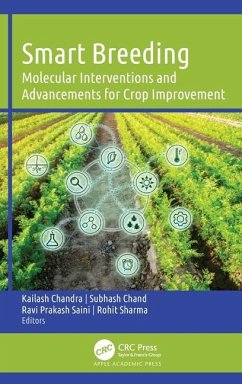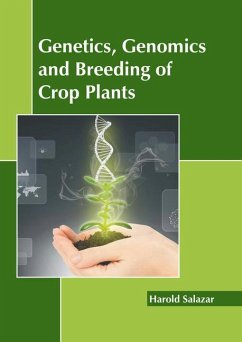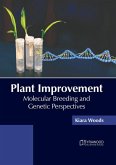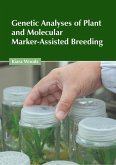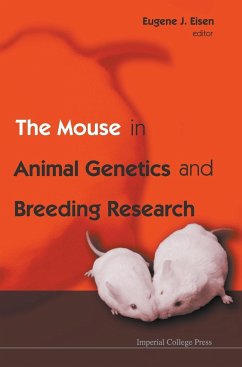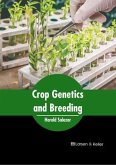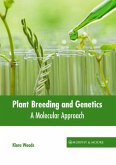Smart Breeding
Molecular Interventions and Advancements for Crop Improvement
Herausgeber: Chandra, Kailash; Saini, Ravi Prakash; Chand, Subhash
Smart Breeding
Molecular Interventions and Advancements for Crop Improvement
Herausgeber: Chandra, Kailash; Saini, Ravi Prakash; Chand, Subhash
- Gebundenes Buch
- Merkliste
- Auf die Merkliste
- Bewerten Bewerten
- Teilen
- Produkt teilen
- Produkterinnerung
- Produkterinnerung
Focuses on novel breeding and biotechnological approaches for crop improvement, covering advances in molecular breeding and plant breeding, such as pre-breeding, reverse breeding, allele mining, next-generation sequencing, etc., to develop climate-resilient crops that can withstand hostility or adversities of climate.
Andere Kunden interessierten sich auch für
![Genetics, Genomics and Breeding of Crop Plants Genetics, Genomics and Breeding of Crop Plants]() Genetics, Genomics and Breeding of Crop Plants147,99 €
Genetics, Genomics and Breeding of Crop Plants147,99 €![Textbook of Animal Genetics and Breeding Textbook of Animal Genetics and Breeding]() Textbook of Animal Genetics and Breeding138,99 €
Textbook of Animal Genetics and Breeding138,99 €![Plant Improvement: Molecular Breeding and Genetic Perspectives Plant Improvement: Molecular Breeding and Genetic Perspectives]() Plant Improvement: Molecular Breeding and Genetic Perspectives143,99 €
Plant Improvement: Molecular Breeding and Genetic Perspectives143,99 €![Genetic Analyses of Plant and Molecular Marker-Assisted Breeding Genetic Analyses of Plant and Molecular Marker-Assisted Breeding]() Genetic Analyses of Plant and Molecular Marker-Assisted Breeding140,99 €
Genetic Analyses of Plant and Molecular Marker-Assisted Breeding140,99 €![MOUSE IN ANIMAL GENETICS & BREEDING RE.. MOUSE IN ANIMAL GENETICS & BREEDING RE..]() Eugene J EisenMOUSE IN ANIMAL GENETICS & BREEDING RE..155,99 €
Eugene J EisenMOUSE IN ANIMAL GENETICS & BREEDING RE..155,99 €![Crop Genetics and Breeding Crop Genetics and Breeding]() Crop Genetics and Breeding143,99 €
Crop Genetics and Breeding143,99 €![Plant Breeding and Genetics: A Molecular Approach Plant Breeding and Genetics: A Molecular Approach]() Plant Breeding and Genetics: A Molecular Approach140,99 €
Plant Breeding and Genetics: A Molecular Approach140,99 €-
-
-
Focuses on novel breeding and biotechnological approaches for crop improvement, covering advances in molecular breeding and plant breeding, such as pre-breeding, reverse breeding, allele mining, next-generation sequencing, etc., to develop climate-resilient crops that can withstand hostility or adversities of climate.
Produktdetails
- Produktdetails
- Verlag: Apple Academic Press
- Seitenzahl: 446
- Erscheinungstermin: 13. Februar 2024
- Englisch
- Abmessung: 240mm x 161mm x 28mm
- Gewicht: 831g
- ISBN-13: 9781774913314
- ISBN-10: 1774913313
- Artikelnr.: 69925041
- Herstellerkennzeichnung
- Libri GmbH
- Europaallee 1
- 36244 Bad Hersfeld
- gpsr@libri.de
- Verlag: Apple Academic Press
- Seitenzahl: 446
- Erscheinungstermin: 13. Februar 2024
- Englisch
- Abmessung: 240mm x 161mm x 28mm
- Gewicht: 831g
- ISBN-13: 9781774913314
- ISBN-10: 1774913313
- Artikelnr.: 69925041
- Herstellerkennzeichnung
- Libri GmbH
- Europaallee 1
- 36244 Bad Hersfeld
- gpsr@libri.de
Kailash Chandra, PhD, is currently working as Assistant Professor in the Department of Plant Breeding and Genetics at Sri Karan Narendra Agriculture University-Jobner, Rajasthan, India. His research mainly focuses on pulse breeding, barley breeding, biotic stress, and molecular breeding. He has published more than 25 research papers in various national and international journals. He has also published book chapters with various reputed publishers, including Elsevier, Springer, Nova, IntechOpen, and CRC Press. He is also serving as a life member of various scientific societies, such as the Indian Society of Genetics and Plant Breeding, Indian Society of Plant Breeders, and the Indian Science Congress Association. Dr. Chandra is the recipient of a Young Scientist Award from the Agricultural Technology Development Society, Uttar Pradesh, India. He has obtained his BSc (Ag.) degree from the University of Agricultural Sciences, Dharwad, Karnataka (ICAR-National Talent Scholarship) and MSc (Ag.) from the University of Agricultural Sciences, Bangalore, Karnataka (ICAR-Junior Research Fellowship). He earned his PhD degree from Banaras Hindu University, Varanasi, Uttar Pradesh (ICAR- Senior Research Fellowship), India. He has also qualified ICAR-NET, CSIR-UGC NET and JRF in life science. Subhash Chand is pursuing his PhD at the Division of Genetics, ICAR-Indian Agricultural Research Institute, New Delhi, India, working on the identification of white rust disease resistance gene/s in Indian mustard (Brassica juncea). Before this, he was posted at the ICAR-Indian Grassland and Fodder Research Institute, Jhansi, as a scientist (genetics and plant breeding). He has three years of experience in forage and fodder crops, including oat, fodder maize, berseem, lucerne, guinea grass, BN hybrids, and others while working in ICAR-AICRP on forage crops and utilization. He has published more than ten research papers in international and national journals, including Frontiers in Plant Sciences, Journal of Plant Growth Regulation, Grass and Forage Science, Plant Breeding, Indian Journal of Genetics and Plant Breeding, and others. He has also published several book chapters in books published by Elsevier, Springer, IntechOpen, Nova, CRC Press, Apple Academic Press, and others. He has edited five books on fodder crops published by AICRP on forage crops and utilization, including Database of Forage Crop Varieties: 2020 and Technological Advances in Forage Crop Protection. His specialization areas are genetics and plant breeding, quantitative genetics, disease resistance breeding, and molecular breeding. He was also awarded NTS, JRF, and SRF during his academic period by the ICAR. Mr. Chand graduated from UAS-Dharwad (Karnataka) and earned his postgraduate degree at GBPUA&T-Pantnagar (Uttarakhand), India. Ravi Prakash Saini, PhD, is posted at the ICAR-Indian Grassland and Fodder Research Institute, Jhansi, as a scientist (agricultural biotechnology), where he has been involved in various research programs on forage and fodder crops. He has published research papers in reputed peer-reviewed international and national journals, such as Plos One, Journal of Plant Biochemistry and Biotechnology, and Archives of Phytopathology and Plant Protection. He has published book chapters in books published by CRC Press (Taylor and Francis Group), Nova, and others. His specialization is in tissue culture, molecular cloning, and basic molecular techniques like polymerase chain reaction, northern and southern hybridization, etc. Dr. Saini earned his PhD in Molecular Biology and Biotechnology from the ICAR-Indian Agricultural Research Institute, New Delhi, India, and his PhD on biotic stress tolerance, in which he used host-delivered RNA interference (HD-RNAi) technology as a proof of concept and developed transgenic tobacco lines against H. armigera. He graduated from UAS-Dharwad (Karnataka) and earned his postgraduate degree at from ICAR-IARI, New Delhi, India. He was awarded NTS, ICAR-JRF, and CSIR fellowships during his academic period by the ICAR. Rohit Sharma, PhD, is affiliated with the Department of Plants and Crops, Faculty of Bioscience Engineering, Ghent University, Belgium. His research mainly focuses on RNAi in crop protection, and he also has a great interest in various molecular techniques in crop development, including molecular markers and genome editing. He has published multiple research papers in reputed international journals and book chapters, such as with Elsevier, Springer, Nova, IntechOpen, CRC Press, and others. He completed his PhD at Ghent University, Ghent, Belgium. He received his BSc (Ag.) degree from the University of Agricultural Sciences, Dharwad, Karnataka (ICAR-National Talent Scholarship), and MSc in Crop Science from the University of Hohenheim, Stuttgart, Germany.
1. Insights into Molecular Markers and Applications in the 21st Century 2.
QTL Mapping: Principle, Approaches, and Applications in Crop Improvement 3.
Use of Cutting-Edge Technologies for Pulse Crops Improvement 4. Harnessing
Genome Editing Approaches in Crop Improvement to Reshape Modern Agriculture
5. Towards Smart Plant Breeding: Genome Editing Tools for Efficient
Manipulation of Economically Important Traits of Crop Species 6. Smart
Breeding for Climate Resilient Agriculture 7. Reverse Breeding: A Novel
Tool for Crop Improvement 8. Pre-Breeding to Molecular Breeding for Biotic
Stress Management in Crop Plants 9. Perspectives of MutMap and Its Variants
Towards Next Generation Plant Breeding 10. Allele Mining: Potential Tool
for Accelerated Crop Breeding 11. Marker-Assisted Selection Approaches for
Abiotic Stress Tolerance in Crop Plants 12. Marker-Assisted Selection
Approaches for Improving Quality Traits 13. Recent Advances in Plant
Breeding for Pulse Improvement 14. Role of Next-Generation Sequencing
Technology in Crop Improvement
QTL Mapping: Principle, Approaches, and Applications in Crop Improvement 3.
Use of Cutting-Edge Technologies for Pulse Crops Improvement 4. Harnessing
Genome Editing Approaches in Crop Improvement to Reshape Modern Agriculture
5. Towards Smart Plant Breeding: Genome Editing Tools for Efficient
Manipulation of Economically Important Traits of Crop Species 6. Smart
Breeding for Climate Resilient Agriculture 7. Reverse Breeding: A Novel
Tool for Crop Improvement 8. Pre-Breeding to Molecular Breeding for Biotic
Stress Management in Crop Plants 9. Perspectives of MutMap and Its Variants
Towards Next Generation Plant Breeding 10. Allele Mining: Potential Tool
for Accelerated Crop Breeding 11. Marker-Assisted Selection Approaches for
Abiotic Stress Tolerance in Crop Plants 12. Marker-Assisted Selection
Approaches for Improving Quality Traits 13. Recent Advances in Plant
Breeding for Pulse Improvement 14. Role of Next-Generation Sequencing
Technology in Crop Improvement
1. Insights into Molecular Markers and Applications in the 21st Century 2.
QTL Mapping: Principle, Approaches, and Applications in Crop Improvement 3.
Use of Cutting-Edge Technologies for Pulse Crops Improvement 4. Harnessing
Genome Editing Approaches in Crop Improvement to Reshape Modern Agriculture
5. Towards Smart Plant Breeding: Genome Editing Tools for Efficient
Manipulation of Economically Important Traits of Crop Species 6. Smart
Breeding for Climate Resilient Agriculture 7. Reverse Breeding: A Novel
Tool for Crop Improvement 8. Pre-Breeding to Molecular Breeding for Biotic
Stress Management in Crop Plants 9. Perspectives of MutMap and Its Variants
Towards Next Generation Plant Breeding 10. Allele Mining: Potential Tool
for Accelerated Crop Breeding 11. Marker-Assisted Selection Approaches for
Abiotic Stress Tolerance in Crop Plants 12. Marker-Assisted Selection
Approaches for Improving Quality Traits 13. Recent Advances in Plant
Breeding for Pulse Improvement 14. Role of Next-Generation Sequencing
Technology in Crop Improvement
QTL Mapping: Principle, Approaches, and Applications in Crop Improvement 3.
Use of Cutting-Edge Technologies for Pulse Crops Improvement 4. Harnessing
Genome Editing Approaches in Crop Improvement to Reshape Modern Agriculture
5. Towards Smart Plant Breeding: Genome Editing Tools for Efficient
Manipulation of Economically Important Traits of Crop Species 6. Smart
Breeding for Climate Resilient Agriculture 7. Reverse Breeding: A Novel
Tool for Crop Improvement 8. Pre-Breeding to Molecular Breeding for Biotic
Stress Management in Crop Plants 9. Perspectives of MutMap and Its Variants
Towards Next Generation Plant Breeding 10. Allele Mining: Potential Tool
for Accelerated Crop Breeding 11. Marker-Assisted Selection Approaches for
Abiotic Stress Tolerance in Crop Plants 12. Marker-Assisted Selection
Approaches for Improving Quality Traits 13. Recent Advances in Plant
Breeding for Pulse Improvement 14. Role of Next-Generation Sequencing
Technology in Crop Improvement

